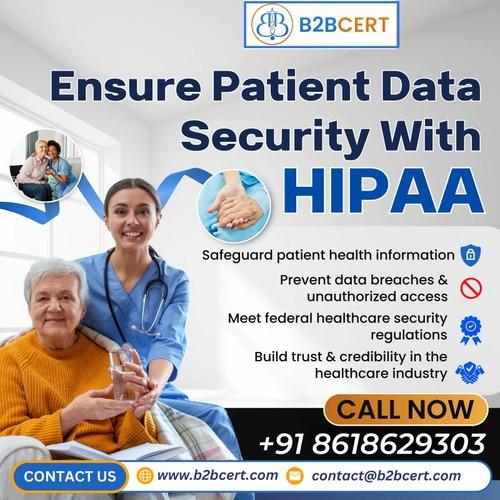In today’s digital world, safeguarding patient information is a top priority for any healthcare organization. As data breaches continue to rise and regulatory expectations become more stringent, many healthcare providers are turning to HIPAA Certification in New York as a critical step toward strengthening their data security posture. Hospitals, clinics, telehealth providers, and medical service organizations across the region are increasingly recognizing the value of certification in building trust and ensuring long-term compliance.
HIPAA certification not only improves data protection but also enhances operational efficiency and patient satisfaction. Below are real-life, generalized case studies that illustrate how organizations overcame challenges, adopted best practices, and achieved transformational results through HIPAA compliance. These examples offer guidance for any business considering certification, as well as insight into how HIPAA Consultants in New York support organizations through the process.
Case Study 1: Strengthening Data Security in a Multi-Location Healthcare Network
A large healthcare network with multiple facilities across New York sought HIPAA Certification in New York to address recurring internal audit findings related to unsecured patient data. The organization faced issues such as outdated systems, inconsistent data-handling procedures, and insufficient employee training. Leaders recognized that without a strong compliance framework, the risks of data breaches and penalties were high.
Challenges Faced
- Variations in data security practices across departments
- Lack of centralized policies for PHI handling
- Outdated cybersecurity tools
- Limited staff awareness regarding HIPAA regulations
Strategies Implemented
The organization partnered with HIPAA Consultants in New York to conduct a gap analysis. The consultants evaluated existing safeguards, administrative controls, and technical security measures. This was followed by:
- Implementing standardized data protection policies
- Migrating to a more secure electronic health record system
- Establishing an organization-wide training program
- Introducing multi-factor authentication and encryption protocols
A HIPAA Audit in New York verified that all corrective measures complied with HIPAA standards.
Positive Outcomes
- A significant reduction in IT vulnerabilities
- Improved consistency in PHI handling
- Enhanced staff accountability
- Higher patient trust in data security practices
Despite the initial HIPAA Cost in New York, the modernization of systems and processes proved beneficial by reducing the risk of costly breaches and enhancing operational reliability.
Case Study 2: A Telehealth Provider Enhances Patient Trust Through HIPAA Compliance
A growing telehealth organization offering remote consultations realized that its rapid expansion introduced data privacy risks. Although the organization used digital tools extensively, its cybersecurity framework was not fully aligned with HIPAA requirements. The provider sought HIPAA Certification in New York to enhance credibility and reassure patients that their sensitive information was protected.
Challenges Faced
- Increased cybersecurity threats due to remote services
- Unsecured communication channels
- Lack of documented policies for telemedicine data governance
- Difficulty monitoring third-party software compliance
Strategies Implemented
With guidance from HIPAA Consultants in New York, the provider:
- Expanded encryption protocols across video and messaging systems
- Introduced secure telehealth platforms approved for HIPAA compliance
- Updated vendor agreements to meet HIPAA standards
- Developed incident response and breach notification procedures
A comprehensive HIPAA Audit in New York ensured all technical and administrative safeguards were effective.
Positive Outcomes
- Stronger cybersecurity posture
- Higher adoption of telehealth services
- Improved transparency in patient communications
- Reduced vulnerability to cyberattacks
The investment in HIPAA Cost in New York was outweighed by increased patient engagement and successful expansion of telehealth operations.
Case Study 3: A Specialty Clinic Overcomes Compliance Barriers Through Structured Implementation
A mid-sized specialty clinic in New York struggled with compliance due to limited internal resources and outdated data storage systems. Management recognized that achieving HIPAA in New York would require a structured and phased approach to overcome budget limitations and operational constraints.
Challenges Faced
- Lack of dedicated compliance personnel
- Paper-based patient records difficult to secure
- Outdated IT infrastructure
- No formal training on HIPAA rules
Strategies Implemented
Working with external HIPAA Consultants in New York, the clinic implemented a step-by-step program:
- Transitioning from paper records to secure electronic systems
- Installing firewalls, intrusion detection systems, and secure access controls
- Conducting staff workshops on PHI privacy and security
- Creating detailed documentation, policies, and procedures
Following implementation, the clinic underwent a HIPAA Audit in New York, which confirmed strong adherence to all requirements.
Positive Outcomes
- Improved record management and easier retrieval
- Greater confidence among staff in handling sensitive information
- Reduced administrative errors
- Stronger patient satisfaction due to more efficient processes
Although the HIPAA Cost in New York required careful budgeting, the long-term operational improvements made the investment worthwhile.
Case Study 4: Enhancing Risk Management in a Diagnostic Center
A diagnostic center that handled large volumes of imaging and test data sought HIPAA Certification in New York after experiencing internal data-handling inconsistencies. The organization wanted to reduce the risk of accidental disclosures and improve overall process efficiency.
Challenges Faced
- Employees using unsecured devices
- Inefficient access controls
- No established system for risk assessment
- Gaps in documentation
Strategies Implemented
The organization adopted a systematic approach, including:
- Implementing strict device and access control policies
- Introducing risk assessment procedures conducted annually
- Conducting awareness programs for staff
- Strengthening data backup and recovery protocols
These improvements were validated through a formal HIPAA Audit in New York.
Positive Outcomes
- Significant reduction in compliance risks
- Better technical safeguards
- Consistent data-handling practices
- Improved internal accountability
The diagnostic center reported increased operational efficiency and enhanced reputation among clients.
Conclusion
These success stories demonstrate that HIPAA Certification in New York is more than a regulatory requirement—it is a strategic investment in patient safety, cybersecurity, and organizational effectiveness. With the support of HIPAA Consultants in New York, healthcare providers can streamline compliance efforts, reduce risks, enhance operational efficiency, and strengthen patient trust. While the HIPAA Cost in New York varies depending on organizational size and system complexity, the benefits far outweigh the investment.

